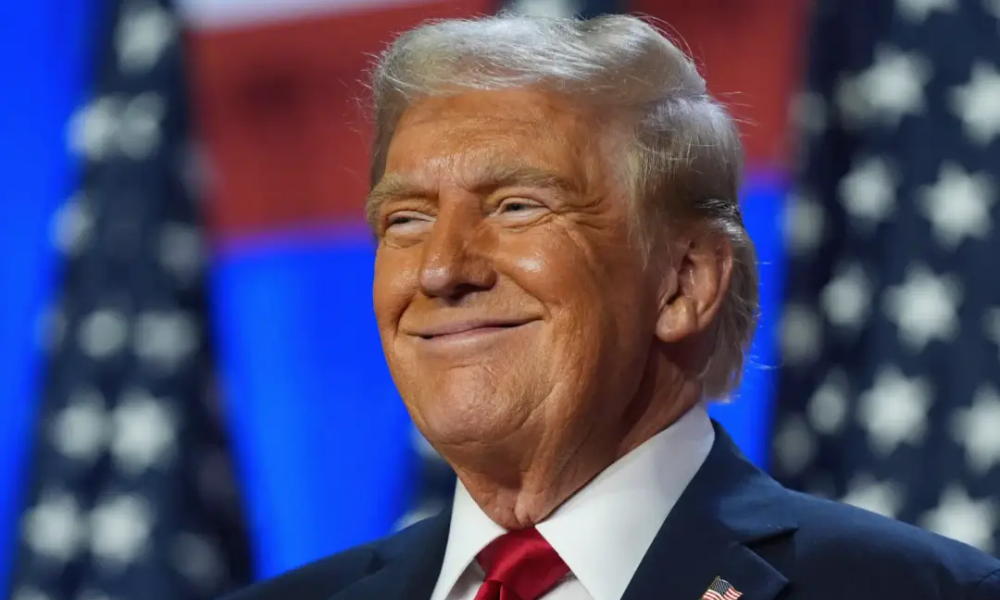

Former President Donald Trump’s win today to reclaim the White House is expected to have enormous implications for regulation, trade, and taxes, with consequences for different asset classes, analysts and managers said in early reactions.
While the complete effects of tariffs that Trump has broadly proposed are a big question, those pose a risk for inflation, which only recently has cooled to historically normal levels. And there are worries about a higher Federal deficit that could accompany tax cuts that Trump is expected to push for, including an extension or increase for provisions of 2017’s Tax Cuts and Jobs Act. And with Republicans winning a majority in the Senate and expected to retain a majority in the House, the conservative party will have leeway to cut taxes and roll back regulations.
The former president declared victory early today over Vice President Kamala Harris, following decisive wins in battleground states that showed a clear margin for him in the electoral college as well as the popular vote. A second Trump presidency leads to uncertainty in many regards, given that his forthcoming term may not resemble his first. However, observers cited likely impacts early on for fixed income and emerging markets equities.
“These election results will be really bad for fixed income and can unwind a lot of the bullishness in fixed income. Trump keeps openly telling people that he will increase tariffs not just on China but with every trade partner. We’re talking 10 percent tariffs across all global partners,” said Andrzej Skiba, Head of BlueBay US Fixed Income at RBC Global Asset Management, in comments provided by the firm. “This is a big deal because this could add 1 percent to inflation. If you add 1 percent to next year’s inflation numbers, we should say bye to rate cuts. With higher tariffs, the fed will not be in a position to cut rates even if the economy is slowing down- and that is a toxic mix for fixed income.”
That could steer the Fed away from rate cuts beyond those expected for the remainder of 2024, Skiba said. The Fed is projected to announce a 25 basis-point cut on Thursday and possibly another cut in December.
“Now that Trump has been victorious, we expect [Federal Reserve] Chair [Jerome] Powell to wait until the administration is in place early next year before reflecting on potential implications for monetary policy,” Skiba said. “We believe that an inflationary trade war would limit Fed’s ability to cut rates in 2025.”
Markets spiked amid the news this morning, but that doesn’t mean investors should make rash decisions about their portfolios, said Paul Schatz, president of Heritage Capital, in an email.
“Futures are popping because markets priced in divided government. Prospects are higher that it will be a sweep. For short-term money this is a good selling opportunity. Stocks may rally for a day or three but let’s not forget that the Fed meets today and tomorrow,” Schatz said. “There will be many winners and losers, but I don’t think those portfolio moves should be taken on such an emotional day. Let the markets settle down.”
Owning stocks and selling bonds is “the basic Trump strategy,” he said. “Own the dollar. Sell gold. Small caps over large caps.”
Regulatory changes, such as leadership at the Federal Trade Commission, could lead to more merger and acquisition activity across industries, he said. Energy stocks could benefit from expanded domestic drilling, but that isn’t a sure bet, given that increased supply could suppress prices, he said.
Prior election results have shown that the stock market is usually up several months afterward. However, there could be a rally into the end of the year, said Tom Essaye, president of Sevens Report Research, in his report this morning.
“Markets will price in a future pro-growth policy agenda and also price in a likely full extension (and possible increase) of the Tax Cuts and Jobs Act. In 2016, the Republican sweep led to a 4.5 percent rally into year-end and given the currently positive macroeconomic backdrop of solid growth, falling inflation, and looming Fed rate cuts a rally to, and through, 6,000 in the S&P 500 before year-end is entirely possible (and shouldn’t be a surprise).
The potential market winners for the Republican agenda going forwards are the categories of value, small caps, cyclical and domestic sectors including industrials, defense, energy, transports, and financials, he said.
Generally, expectations now are that M&A could increase amid de-regulation.
“If M&A activity picks up, this would generally be perceived as good for small-cap equities and smaller companies,” said Murphy O’Flaherty, senior portfolio manager and senior equity analyst at RBC, in the company’s comments. “Trump’s victory could be perceived as positive for metals, mining, energy, financials/banks. Now that Trump is elected, this might create a headwind for alternative energy, especially wind, and this could negatively impact companies associated with climate change.”

The up-and-coming Los Angeles-based RIA is looking to tap Merchant's resources to strengthen its alts distribution, advisor recruitment, and family office services.

US wealth advisory business will get international footprint boost with new tie-ups.

New research shows physicians start their careers at least $200K in debt.

By listening for what truly matters and where clients want to make a difference, advisors can avoid politics and help build more personal strategies.

JPMorgan and RBC have also welcomed ex-UBS advisors in Texas, while Steward Partners and SpirePoint make new additions in the Sun Belt.
Orion's Tom Wilson on delivering coordinated, high-touch service in a world where returns alone no longer set you apart.
Barely a decade old, registered index-linked annuities have quickly surged in popularity, thanks to their unique blend of protection and growth potential—an appealing option for investors looking to chart a steadier course through today's choppy market waters, says Myles Lambert, Brighthouse Financial.
